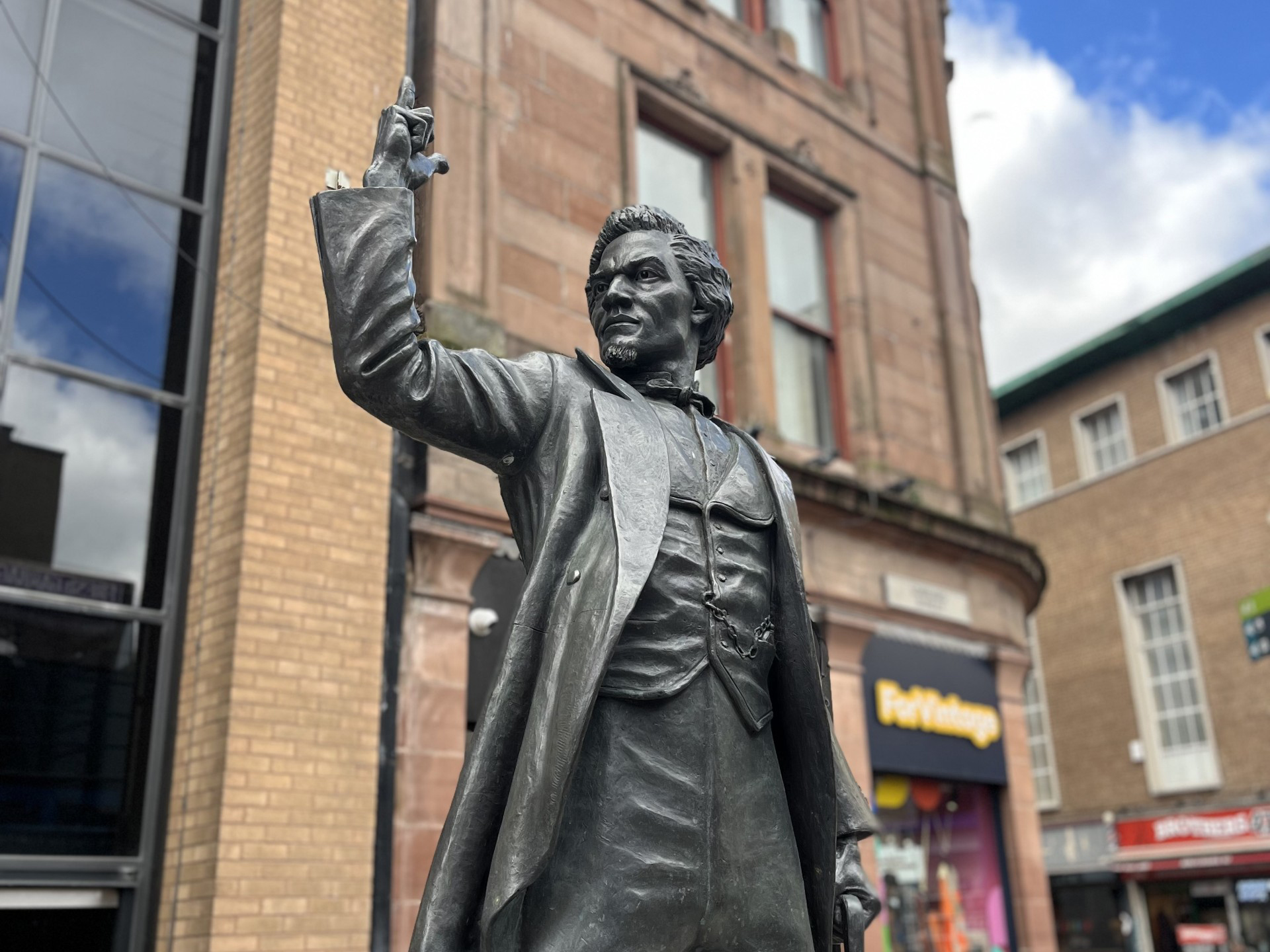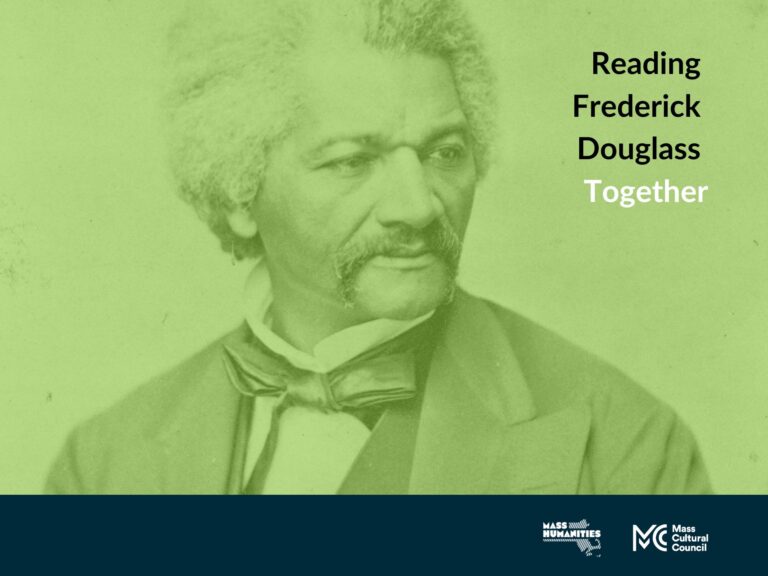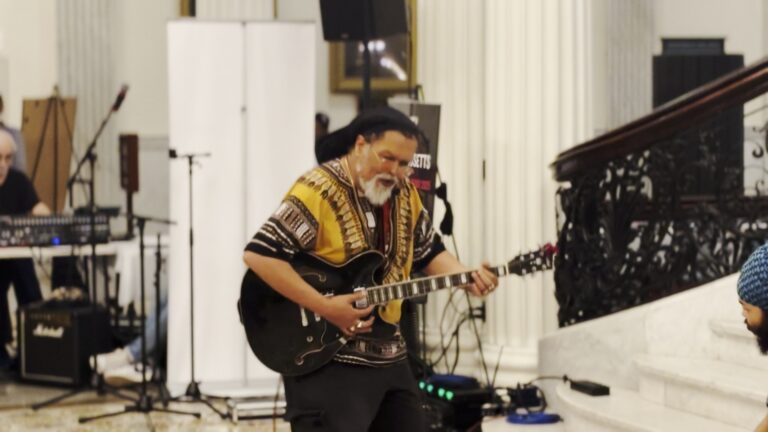By Brian Boyles
A newly dedicated statue of Frederick Douglass stands on a scruffy block in Belfast, Northern Ireland, between a vintage clothing store and a Caffe Nero, just around the corner from the First Presbyterian Church, where Douglass spoke in 1845. It is a humble location for a heroic figure whose visit left a lasting impact on the Irish people.
In April, I spent a week in Ireland and Northern Ireland with nine other Massachusetts residents who partner with us for the Reading Frederick Douglass Together program. The trip was planned as part of our celebration of Mass Humanities’ 50th anniversary. We’ll share more stories from our travels in the coming weeks.
As we traced Douglass’s footsteps, we met diplomats, bartenders, students, and musicians who had something to say about a man often referred to simply as “Frederick.”
This familiarity with the great orator is yet another connection between our state and the Emerald Isle. In February, Senate President Karen Spilka installed a bust of Douglass at the State House. Mass Humanities supported public readings of Douglass’s 4th of July speech in forty communities last year. A new statue was dedicated last summer in New Bedford, the city where Douglass first found freedom. By celebrating his legacy, we preserve the memory of Massachusetts as a powerful force in the fight to end slavery.
Throughout our trip, however, it became clear that another narrative exists in Ireland and Northern Ireland. Almost 170 years after his visit, Douglass is a source of inspiration for a new generation of immigrants to the island. Their embrace of this history provides helpful examples for Massachusetts, a place struggling to meet its own influx of newcomers.
The story of Douglass in Ireland begins here. On August 16, 1845, Douglass boarded the steamship Cambria in Boston for a journey that would reshape his life and career. The 27-year-old had recently completed his Narrative of the Life of Frederick Douglass, an American Slave while living in Lynn with his wife and three young children. The publication of his autobiography brought him to prominence, but it also exposed him to capture and a return to bondage in Maryland. He set sail at the encouragement of William Lloyd Garrison and abolitionist organizations in the U.K. who organized a speaking tour that expanded to almost two years.
Landing in Liverpool, Douglass and his traveling companions crossed the Irish Sea to Dublin, where the orator delivered lectures to large audiences, including events at City Hall, the Music Hall, and even at a local prison, and attended a speech by the Irish “liberator,” Daniel O’Connell. Douglass gave about 20 speeches in Belfast, most arranged by female anti-slavery groups and at Protestant churches throughout the city. His travels unfolded as the Irish Famine began to take hold in the Irish countryside, setting in motion a catastrophe that saw 1 million deaths and the outward migration of 2 million people. The speaking tour earned the funds to purchase Douglass’s freedom as well as his first printing press, setting in motion a new stage in his life and influence.
Our group visited Cork and Belfast for the annual #DouglassWeek symposium. We spoke in places where Douglass once spoke, presented new research, and met with officials on both sides of the border. We engaged in conversations with people whose families immigrated to these cities, and with the organizations supporting them.
We shared the stage with Raphael Olympio, a hip-hop artist whose family left post-civil war Togo for Cork. He sees Douglass as a role model in a country that still struggles to acknowledge the stories of Black residents. We heard Ryan Murphy, Lord Mayor of Belfast, describe the statue of Douglass as a “rallying cry” for the city to serve as refuge. We listened to a panel discussion moderated by Lillian Seenoi-Barr, who this week became the first Black woman elected mayor of a city in Northern Ireland.
We also met Kenneth B. Morris, Jr., Douglass’s great-great-great-grandson. Morris emphasized that the story of Douglass is not that of a lone genius, but of a family, starting with his wife and partner in liberation, Anna. Surrounding Douglass in Ireland was an ecosystem that included Quaker congregations, women’s anti-slavery groups and the families who welcomed him into their homes.
We saw the modern-day incarnation of this ecosystem. Grassroots organizations like Redeemer Central in Belfast and the Cork Migrant Centre strive to make their cities more welcoming to immigrant communities. For the community leaders in Belfast and Cork, the story of Frederick Douglass was proof that it was possible.
It is also possible in Massachusetts, a state with the largest percentage growth in its immigrant population since 2012. Like our Irish counterparts, we face a housing crisis, strains on our social safety net, and rising anti-immigrant sentiment. We also have communities and organizations helping families settle and start anew, including many of our Expand Massachusetts Stories grantee partners.
We have more than a history to preserve—we have a tradition to uphold. People fleeing the effects of climate change, war, and tyranny arrive in towns that were once stops in the Underground Railroad. We can imagine a Massachusetts that celebrates its past by repeating its best chapters.
Every year for Reading Frederick Douglass Together, we recite the line from the 4th of July speech, “We have to do with the past only as we can make it useful to the present and to the future.” I came home with the hope that Massachusetts can inspire more people to repeat the words that Douglass wrote from Ireland in a letter to Garrison.
“I can truly say, I have spent some of the happiest moments of my life since landing in this country. I seem to have undergone a transformation. I live a new life.”






